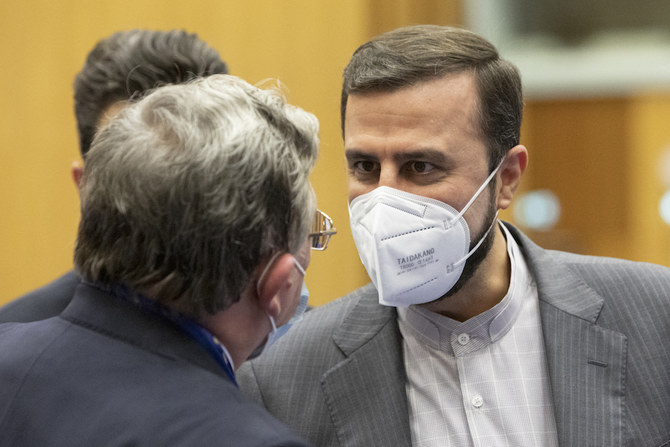LONDON: The United States is in “the midst of the very final stages” of indirect talks with Iran aimed at salvaging a 2015 deal limiting Tehran’s nuclear activities, State Department spokesperson Ned Price said on Wednesday.
“This is really the decisive period during which we’ll be able to determine whether a mutual return to compliance with the JCPOA is in the offing, or if it’s not,” Price — using an abbreviation for the Joint Comprehensive Plan of Action, the 2015 deal with world powers — told reporters.
Iran’s lead nuclear negotiator Ali Bagheri Kani responded in a tweet, calling on Western powers “to be realistic, avoid intransigence and heed lessons of past 4yrs. Time for their serious decisions.”
“After weeks of intensive talks, we are closer than ever to an agreement; nothing is agreed until everything is agreed, though,” he tweeted.
After weeks of intensive talks, we are closer than ever to an agreement; nothing is agreed until everything is agreed, though.
Our negotiating partners need to be realistic, avoid intransigence and heed lessons of past 4yrs.
Time for their serious decisions. https://t.co/kRnSte9Bzu— علی باقریکنی (@Bagheri_Kani) February 16, 2022
World powers are entering the final stage of talks with Iran in Vienna aimed at reviving the 2015 deal, which was rendered moribund by the US walking out of the accord in 2018.
The administration of president Donald Trump reimposed sanctions against Iran, battering the Iranian economy, while Tehran ramped up its nuclear work in response in violation of the Joint Comprehensive Plan of Action (JCPOA).
Earlier on Wednesday, France said Tehran had just days left to accept the deal, warning that a major crisis would be unleashed if there is no agreement.
“It is not a question of weeks, it is a question of days,” French Foreign Minister Jean-Yves Le Drian told the Senate, adding that the “moment of truth” had now arrived in the marathon process.
“We need political decisions from the Iranians. They have a very clear choice,” Le Drian said.
“Either they unleash a serious crisis in the next days... or they accept an agreement that respects the interests of all the parties, especially those of Iran,” he said.
He described a deal as being “within grasp” and noted there was now agreement on an accord between the European powers in the negotiations — France, Germany and Britain — as well as China, Russia and the US.
“We have found convergence significant enough to enable an agreement that is within grasp right now,” he said.
But he said that time was running out because Iran was continuing to intensify its nuclear activities in violation of the 2015 deal, which aimed to provide safeguards that Tehran would never seek a nuclear weapon.
“The more this goes on, the more Iran is accelerating its nuclear procedures,” he said.
China’s envoy to the talks said that Iran was being constructive by putting everything on the table in response to US approaches. “They have not only adopted this straightforward approach but also made a political decision based on give and take,” Wang Qun told Reuters.
Meanwhile, Iran urged the US Congress to issue a “political statement” that Washington will stay committed to a possible agreement in Vienna talks to restore the deal.
Iran’s Foreign Minister Hossein Amir-Abdollahian urged the US guarantee on the JCPOA in an interview with the Financial Times published on his ministry’s website.
“As a matter of principle, public opinion in Iran cannot accept as a guarantee the words of a head of state, let alone the United States, due to the withdrawal of Americans from the JCPOA,” he said.
He stressed he had asked Iranian negotiators to propose to the Western parties that “at least their parliaments or parliament speakers, including the US Congress, can declare in the form of a political statement their commitment to the agreement and return to the JCPOA implementation.”
“Iran’s commitments are as clear as a mathematical formula,” said Amir-Abdollahian.
“It is absolutely clear what we are supposed to do and how these measures will be verified” through the UN’s International Atomic Energy Agency, he said, adding that the other parties must have “no concern.”
“But we remain concerned primarily about the guarantees” from the US side, he noted, adding that “we are facing problems during this period because the other party lacks a serious initiative.”
He also said Iran was ready to enter into the process of direct talks with the US, adding if Washington’s intentions are “genuine” they should take some “practical and tangible steps on the ground before any direct talks and contacts can take place.”
(With Reuters and AFP)

























